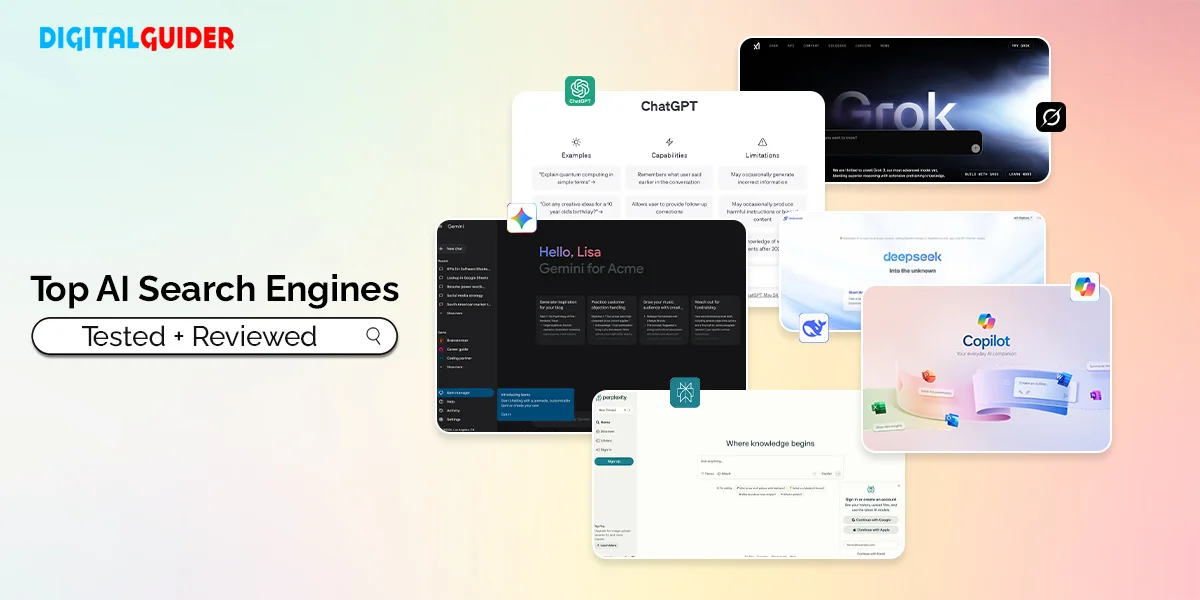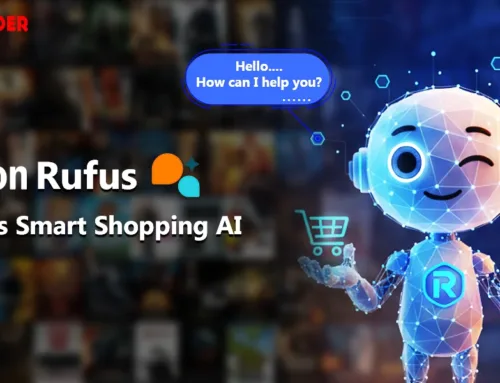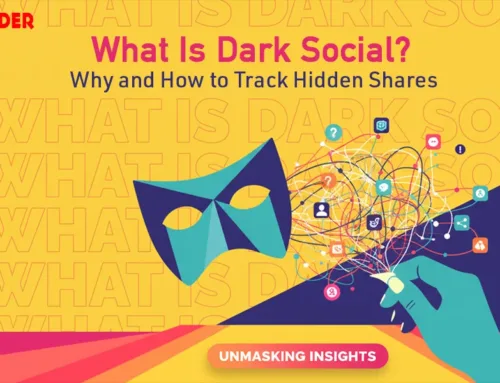For years, Google was everyone’s first stop when looking for answers online. Type a question, get ten blue links, and you’re done. But lately, that experience feels different. Between ads, clutter, and repetitive results, more people are saying it — Google Search just isn’t as good as it used to be.
Now, a new wave of tools is changing how we search. AI search engines don’t just show links — they explain things, summarize sources, and talk to you like a real assistant. They pull information from across the web and turn it into clear, conversational answers.
So the big question is: who’s doing it best? Newcomers like Perplexity, Copilot, and You.com are testing Google’s long-held dominance.
In this article, we’ll test these AI search engines to see how they compare in real use. By the end, you’ll know which one gives the smartest, most reliable results — and whether Google still deserves to be on top.
The Top AI Search Contenders (Tested & Reviewed)
To understand how AI search engines are transforming, we conducted a real-world test comparing the leading players using a common set of user queries. Each platform was evaluated on accuracy, speed, source reliability, conversational quality, and user experience.
The goal? To find out which AI search engine delivers the most accurate, useful, and human-like results, not just the flashiest interface.
Our queries covered a mix of factual, opinion-based, and trending topics, such as:
- What are the most effective SEO trends for 2025?
- Summarize the latest AI regulation updates from the EU.
- Compare Apple Intelligence and Google Gemini AI models.
- Write a summary of the OpenAI vs Anthropic rivalry.
Here’s how each one stacked up when put to the test 👇
1. Perplexity AI — The Researcher’s Favorite
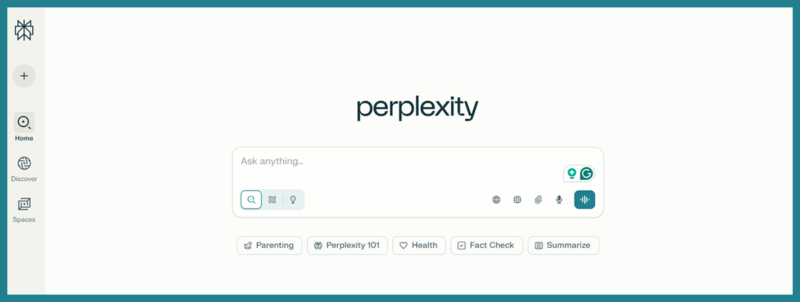
If there’s one AI engine that genuinely feels built for research-grade accuracy, it’s Perplexity AI.
In every test, it stood out for its ability to deliver up-to-date, well-cited answers with verifiable sources. The interface is clean, focused, and refreshingly minimal, you ask, it answers, backed by links you can actually trust.
When we ran time-sensitive queries like “current AI legislation in the US”, perplexity pulled in recent data from live sources—including tech publications, news outlets, and verified blogs, all in seconds.
It doesn’t just summarize, it provides evidence-based responses.
Our verdict:
|
2. ChatGPT Search — The Conversational Thinker
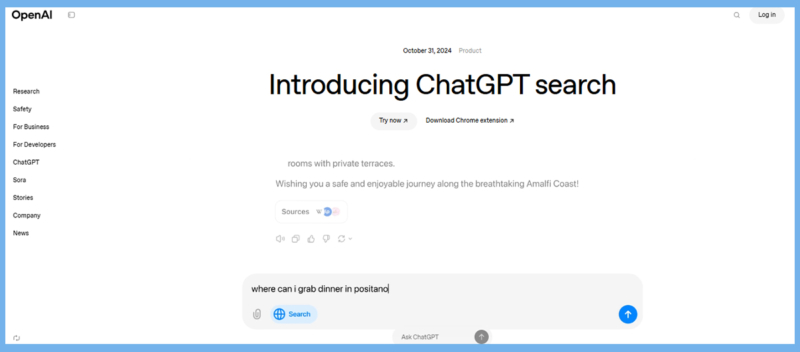
ChatGPT Search, powered by OpenAI, is perhaps the most human-like of all.
Unlike Perplexity, which is built for precision, ChatGPT Search shines in contextual understanding. It doesn’t just give you data, it reasons through it.
For example, when we asked, “How does AI search affect SEO strategy in 2025?”, ChatGPT didn’t list generic points. Instead, it explained how semantic indexing, conversation search intent, and zero-click results are shaping new SEO tactics, almost like a thought partner guiding you through the topic.
Its biggest strength lies in dialogue continuity. You can refine, follow up, and resurrect queries naturally, like a real conversation.
Our verdict:
|
Also read, How ChatGPT is different from Gemini?
Fact – OpenAI rolled out ChatGPT Search globally in February 2025, integrated with real-time web browsing.
3. You.com — The Privacy-Driven Innovator
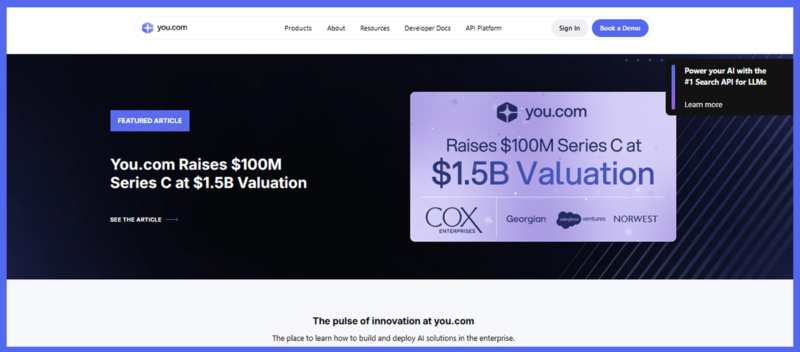
You.com takes a different route. Richard Socher, former Chief Scientist at Salesforce, commented: “You.com demonstrates how AI search can prioritize user choice, control, and transparency—important factors as search personalization becomes more prevalent.” The platform allows you to choose between “factual,” creative,” and “balanced” response modes, giving it a flexibility edge over most competitors.
When we tested You.com with content and technical queries, it offered quick summaries and structured answers, often pulling data from relevant sources. However, the factual depth varied depending on the mode; its creative mode tended to overgeneralize, while the factual mode was crisp and useful.
Where it wins is developer accessibility. Through its YouPro tools and Web Search API, developers can integrate You.com into custom workflows, making it more than just a search engine.
Our verdict:
|
4. Claude AI — The Ethical Intellectual
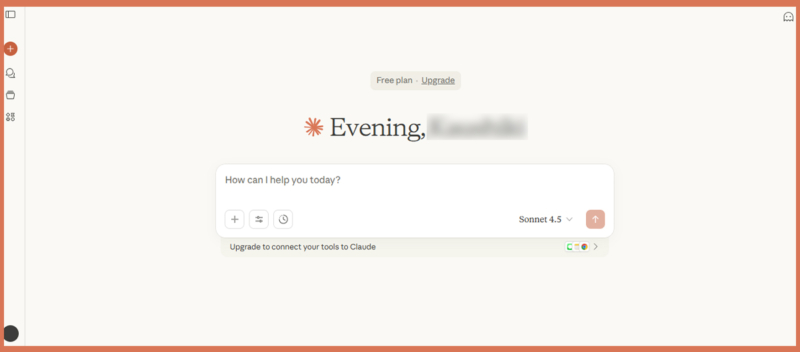
Claude AI, developed by Anthropic, stood out for its tone and reasoning.
Where most AI engines prioritize speed, Claude prioritizes safety, balance, and interpretive clarity. It’s built on Anthropic’s Constitutional AI framework, designed to ensure ethical and unbiased outputs — and it shows.
In our testing, Claude excelled in complex reasoning and content summarization. When asked to summarize debates around AI ethics, it didn’t just paraphrase — it offered structured pros, cons, and implications.
However, it struggled slightly on real-time questions since live data access is relatively new to the platform.
Our verdict:
|
Update: Claude added web search functionality in March 2025
5. Bing Copilot Search — The Speed-Focused Assistant
Microsoft’s Bing Copilot Search represents the most practical balance between traditional search and AI assistance. As Satya Nadella, Microsoft CEO, said: “AI in search is about enhancing human productivity—Bing Copilot is an example of how AI can surface insights faster and more reliably.”
When tested on trending or fact-heavy queries, Bing Copilot generates neatly summarized responses with clear citations and follow-up prompts. Its “Discover more” feature made it easy to dig deeper without leaving the result page.
However, its biggest trade-off is personality; Bing Copilot prioritized speed and efficiency over conversational depth.
Our verdict:
|
Our Test Results: Side-by-Side Comparison
| AI Search Engine | Best Feature | Ideal For | Where It Falls Short |
| Perplexity AI | Real-time, cited results | Researchers, analysts | Less conversational |
| ChatGPT Search | Deep reasoning, conversational | Marketers, learners | Slightly slower |
| You.com | Customization & privacy | Developers, general users | Uneven factuality |
| Claude AI | Balanced, ethical output | Educators, enterprises | Limited live data |
| Bing Copilot | Speed + summaries | General users | Minimal interactivity |
After hours of real-world testing, one thing became obvious: AI search isn’t replacing Google yet, but it’s definitely redefining what “search” feels like.
Instead of a results page filled with links, AI search engines now deliver contextual, human-readable answers, often with citations and next-step suggestions.
Interesting read, OpenAI Sora: The AI Revolution Redefined
If Google made us search smarter, these AI tools make us understand faster.
And that shift from finding information to conversing with it is where the future of search truly begins.
How Secure Is Google’s Hold on Search?
So… after all the testing, comparing, and head-to-head matches, the big question: Could Google lose its grip on search? Is its dominance questionable? The short answer: yes—but it’s not an overnight thing.
Several cracks are showing, but also massive buffers that still protect Google.
Let’s break down both sides.
1. Competition from AI Search Tools
New AI search engines are offering experiences Google hasn’t fully perfected yet: conversational search, answers with citations, and summaries without needing to click through dozens of links. These features are particularly appealing, especially to users seeking quick and trustworthy information.
A recent comment said Perplexity is “a significant competitor to Google Search over the long term,” particularly because it emphasizes academic sourcing and providing content that feels fresh and credible.
2. Regulatory & Antitrust Pressure
Government and regulatory bodies are starting to push back. For example:
- In the UK, Google has been designated as a Strategic Market Status (SMS) holder for its search and advertising operations. That status gives regulators the tools to impose controls, such as “choice screens” (allowing users to select their search engine) and ensuring fair ranking practices.
- According to Reuters, Independent publishers have filed complaints in the European Union, alleging that Google’s “AI Overviews” are harming their traffic and violating fair content usage.
- There are antitrust complaints and cases in various jurisdictions challenging Google’s default search agreements, as well as its deals with device manufacturers, among other issues.
3. Shifts in User Behavior & Expectations
Users are increasingly comfortable with chat-style, conversational, or summarized answers. Many don’t want to click multiple links; they want the answer right there. Generative AI and LLLM-based search tools have raised those expectations. If Google does not keep up in UX & interaction quality, some portion of traffic might drift away.
4. Publisher Backlash & Traffic Concerns
Many content publishers are alarmed at how AI Overviews may be reducing click-throughs to their sites. They see potentially large traffic losses as the summaries satisfy user queries before people even scroll to the link list.
Strengths That Still Give Google a Buffer
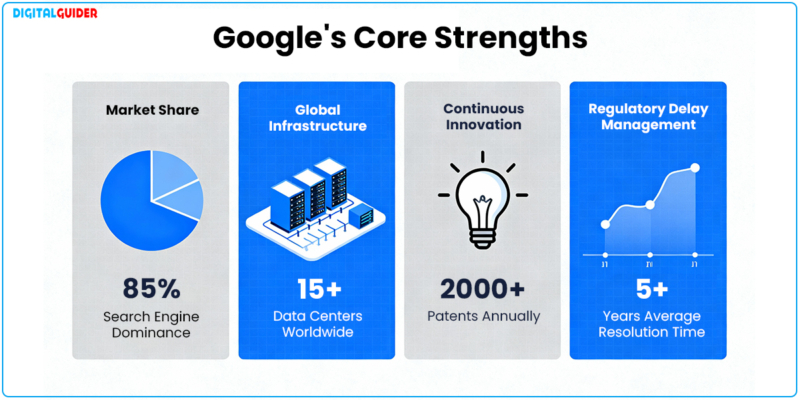
Google holds around 90-91% of the global search market share (or something in that range) across platforms. That means entrenched user behavior: default search on browsers/devices, brand trust, etc., which is very hard to unseat.
Also, its integration with other services (Maps, Gmail, Android, Chrome, etc.) gives it channels rivals can’t easily replicate.
2. Scale, Infrastructure & Data Advantages
Google has massive infrastructure for indexing the web, crawling, ranking, updates, etc. It has huge data resources, long-established algorithms, R&D (e.g., Gemini), large teams, etc. These give it the ability to push forward features like AI Overviews, AI Mode, and many more quickly.
3. Continuous Innovation & AI Integration
Google is not sitting still. It is integrating generative AI into its core search product (e.g., Gemini, AI Overviews), enhancing conversational capabilities, trying to reduce hallucinations, etc. these features reduce the appeal gap for many users.
4. Regulatory Uncertainty Might Slow Disruption
While regulatory is real, changes often take years, legal processes, policy setting, appeals, etc. Also, remedies may force Google to adjust, but don’t necessarily lead to immediate loss of dominance.
Is Google Losing Ground to AI Search Rivals?
Putting those together, here’s where things seem like to go:
- In the short to medium term (1-2 years), Google is relatively safe. Rivals will pick off some traffic, especially for certain query types(conversational, summaries, niche topics), but not wholesale disruption.
- Over a longer horizon (3–5+ years), the likelihood of change grows. If AI search engines keep improving, if Google’s AI features underperform or show inaccuracies, or if regulatory constraints limit how Google uses content or maintains default status, a gradual decline in dominance becomes more plausible.
- Also, Google could use ground in specific segments: voice search, video, local search devices, or where privacy or ethics concerns are high. In those spaces, some of the challengers may have an edge.
What Google Needs to Do (or Might Already be Doing)
To remain ahead, Google is likely to and should:
- Keep pushing improvements in conversation AI, reasoning, and multi-modal search (text + image + video + voice).
- Improve how it handles citations, transparency, fairness, and source diversity.
- Be mindful of publisher relationships (if publishers feel they lose traffic, they push back).
- Adapt to regulatory changes: if “choice screens” become mandatory, or if there are limits on how content is summarized or used for AI training, Google will have to comply.
- Focus on user trust & experience: speed, accuracy, reducing hallucinations, making AI search outputs both useful & reliable.
Google’s facing more pressure than before, but it’s not losing its crown just yet. The real question isn’t if things will change, but how much. New competitors are rising, rules are tightening, and users want more from search, yet Google still has plenty of strengths keeping it ahead.
TL;DR: The Future of Generative Engine Optimization (GEO)
After testing and reviewing multiple AI search engines, one thing is clear: the search landscape is no longer a one-player game. Perplexity emerges as frontrunner for depth and transparency, offering well-cited, conversational answers that feel closer to exper insights than typical snippets.
Google, backed by Gemini, still leads in scale, data accuracy, and ecosystem integration, while Copilot shows promise for task-based and productivity-driven queries.
We’re entering the age of Generative Engine Optimization(GEO), a paradigm shift beyond traditional SEO. Instead of optimizing content purely for blue-link rankings, marketers and publishers now need to focus on how their content is interpreted, summarized, and cited by AI search engines.
AI search engines aren’t just transforming how we search; they’re reshaping what the web is. The next few years will determine whether we fall back into another single-player monopoly or evolve into a diverse ecosystem of specialized AI engines, each designed to understand the world uniquely.
One thing’s certain: the future of search belongs not to the biggest engine, but to the smartest one.
FAQs
Q1. Which AI search engine gives the most accurate answers?
A1. Based on real testing, Perplexity AI consistently delivers the most detailed and well-cited answers, while ChatGPT Search is better for conversational follow-ups. The “best” engine depends on what you’re asking.
Q2. How do you test AI search engines for accuracy and speed?
A2. We compare engines by asking the same queries and measuring how fast they respond, how accurate their answers are, and whether they provide sources, even the conversational flow, to see if follow-up questions retain context.
Q3. Why is Perplexity AI best for research questions?
A3. Perplexity gives answers with real-time citations and links to sources, making it easier to verify facts.
Q4. Can I still get traffic if AI gives answers directly?
A4. Yes. Even if users don’t click through, your content can appear as a cited source, building brand visibility. Structured data, clear summaries, and factual content make your content more likely to be referenced.
Q5. How can I make my content more likely to be cited by AI engines?
A5. Use concise summaries, bullet points, headings, and references, even schema markup and FAQs increase the chances AI will pick your content for summaries or answers.
Q6. Is Bing Copilot Search catching up to Google?
A6. Yes, especially for multimedia responses and contextual answers.
Q7. Do videos and images improve my chances in AI search results?
A7. Absolutely. AI engines and “People Also Ask” boxes often pull multimedia content, especially if it has transcripts, captions, and clear labels. Adding visuals improves chances of appearing in summaries.
Q8. How can I know if my content is cited by AI search engines?
A8. Check manually by searching your content topic in Perplexity, ChatGPT, or Gemini. Use brand-specific queries or tools like SparkToro to see if AI engines reference your pages.
Q9. Should I focus on AI search engines if Google still drives most traffic?
A9. Yes. Early adoption helps you gain visibility before the competition. Google’s SGE already uses AI summaries, so preparing for AI-driven results protects your content’s long-term reach.
Q10. What’s the fastest way to prepare my content for AI search?
A10. Start with clear summaries, factual accuracy, and structured headings. Add citations, bullet points, and FAQ sections. Making your content AI-readable is the fastest way to ensure it gets cited and used in summaries.
